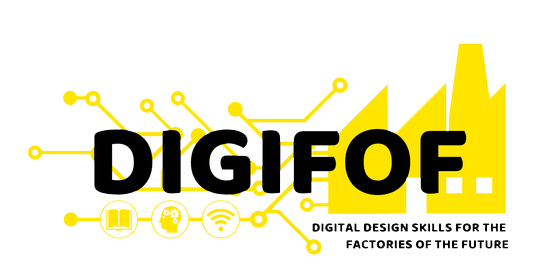The DIGIFOF project proposes a network of training environments where HEIs, enterprises and training insitutions come together to develop skill profiles, training concepts as well as materials for design aspects of the Factory of the Future (FoF). It will create an organizational structure to foster knowledge transfer between industry and academia, aiming to provide educational and experimental OMiLAB4FoF laboratories, where FoF-aspects can be taught practically or experimented with. These will be equipped with modelling, simulation and analysis tools targeting: strategic aspects of FoF (innovative business models, product-service systems, design thinking, crowd-production), process aspects (business process management, enterprise architecture management, product-lifecycle-management) and systems aspects (digital factory, product design, CPS and embedded intelligence, security and safety management).
IMPACT
The desired impact of the project on a specialist level, both for students and professionals, is to innovate education topics and tools, more exactly the part related to Factory of the Future by using more modern approaches towards interdisciplinary education and use of open ICT-tools and materials. This impact is relevant both at local, European and international level given today’s mobility of workforce and globalized working environments. This is considered to be especially important as the topic of Factory of the Future is expected to yield highly qualified jobs in the future European economy, which produce high added value both in economical but also in social terms.
Project aim
DIGIFOF proposes an organizational platform where HEIs, enterprises and training institutions come together to develop skill profiles, trainings and teaching concepts as well as materials for different FoF-design aspects. The platform is completed by laboratories, which provide educational and experimental environments, where aspects of FoF can be taught practically or experimented with. They will be equipped with a variety of open source tools suitable to the FoF-aspects.
Project objectives
- Create an industry-academia cooperation network, i.e. the FoF Design Competence Network, to foster international cooperation and knowledge transfer
- Jointly develop innovative multidisciplinary teaching and training materials to provide job-relevant and high-quality education for students and professionals
- Realize vocational and initial training programs/curricula using a problem-based learning approach
- Jointly develop design/modelling tool(s) for FoF for training/learning and experimentation purposes
- Populate a digital library with online learning materials, case studies, lecture material, tutorials, and webinars in order to disseminate the topic and project results as widely and as sustainable as possible
- Establish OMiLAB4FoFs, virtual and/or physical, equipped with tools and functionalities for ICT-based teaching/learning of FoF-design
- Enable work and training experiences through industrial and university placements in order to provide students with real-life working experience and also facilitate enterprises access to promising candidates
- Realize joint academic/company lecturing, tutoring and supervision for students to be able to work scientifically on real-world problems
- Test the materials and tools developed in an international summer school and foster uptake by different disciplines
- Develop and test a vocational training program for employees in the manufacturing sector dealing with aspects of FoF so as to create value added for the trainees as well as the enterprises
- Develop formal certificates at local level as well as a joint open badge certificate for vocational trainings which will formally document competences and to improve holders’ position in the job market
- Jointly develop a guideline for an industry-academia Master program in FoF-Design in order to to innovate curricula and make the participants HEIs more attractive to their stakeholders
Relevance
Digitization is disrupting the manufacturing industry. Its economic potential is significant: the Fatory of the Future is expected to yield a market of about USD 67 billion globally by 2020. 87% of European manufacturing enterprises estimate that digital transformation is a competitive opportunity. Yet industry needs new types of digital skills, which 90% of European enterprises indicate they lack, as 30-90 million manufacturing employees could lose their (semi)-manual jobs.
FoF’s goal is to interconnect every step of the manufacturing process and seamlessly integrate the physical and digital world. In FoFs, a central computer organizes the intelligent networking of all subsystems, suppliers and customers into one system. All relevant requirements concerning manufacturing and product are confirm at design time, while execution takes place autonomously as ICT and automation are integrated. Thus enterprises must consolidate their product and service development, production logistics and business systems to produce and deliver on a decentralized basis, in a self-directed way in real time.
Because of the merger of previously unconnected technologies and applications due to converging of online and offline worlds, requirements for skills and expertise, for technologies and services in FoF are correspondingly broad. They must integrate knowledge about strategy, processes and systems in the sense of Systems Engineering. The Industry 4.0 FoF-paper recommends using ICT-based modelling to design and manage the relevant systems in FoF. Herein, it includes modelling the interaction and communication between physical and virtual world, under consideration of adequate formalization mechanisms as well as methodic aspects. This is line with the IEC FoF-recommendations which states that “conceptual modelling determines roughly 80% of the total costs of a product and/or service, since domain experts create precise engineering and process specifications as part of the development, using domain-specific modelling and simulation tools”. Strategically applying design as a competitive advantage enables new business opportunities, reduces costs and produces a better user experience, which play a crucial role in the exploitation of digital opportunities.

